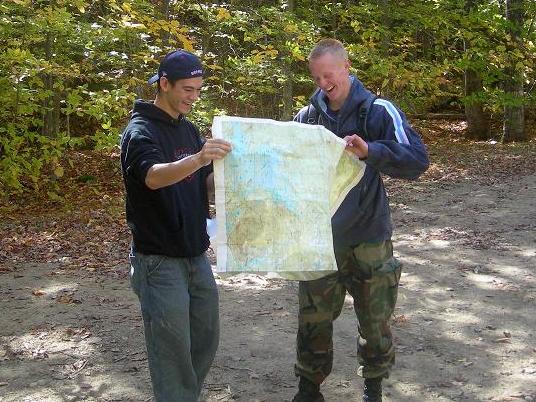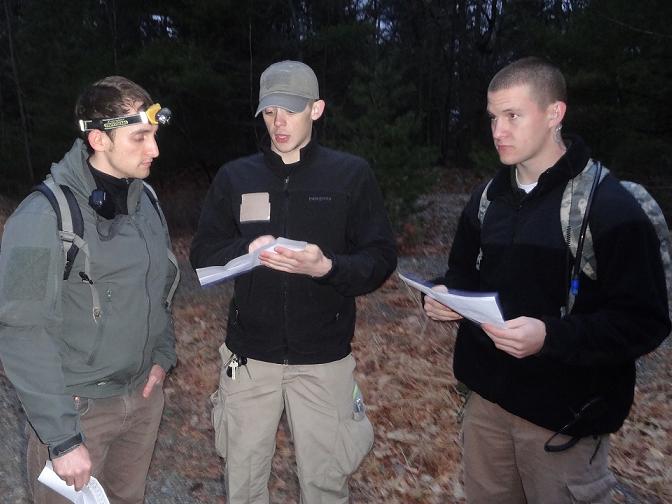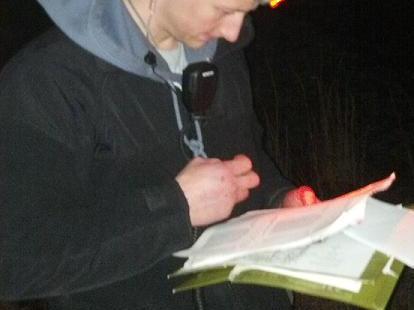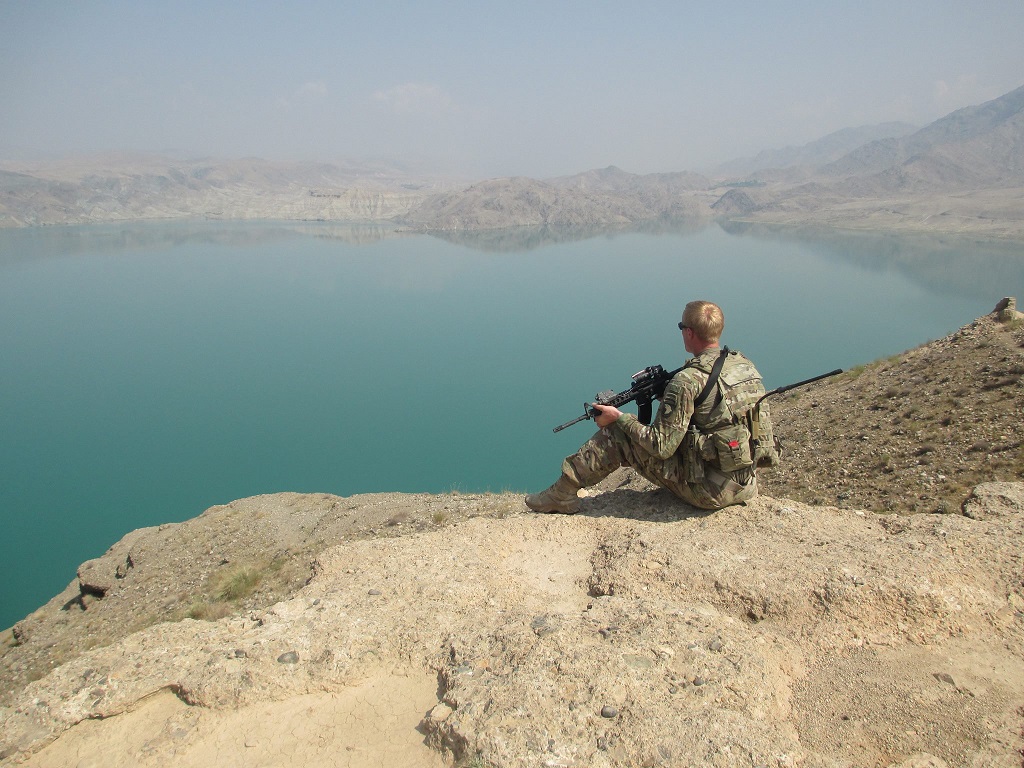 Part of the benefit of being a B-12 Pershing Rifles member is the opportunity to experience working on the company’s staff, and later to command that staff. Although this certainly does not sound as fun and glamorous as simply participating in the actual training operations that B-12 performs, it is nonetheless an essential part of the management of the company and its operations, and of the skill set developed by a B-12 member in preparation for taking a leadership role in the military.
Part of the benefit of being a B-12 Pershing Rifles member is the opportunity to experience working on the company’s staff, and later to command that staff. Although this certainly does not sound as fun and glamorous as simply participating in the actual training operations that B-12 performs, it is nonetheless an essential part of the management of the company and its operations, and of the skill set developed by a B-12 member in preparation for taking a leadership role in the military.
ORGANIZATIONAL COMMAND EXPERIENCE
The staff is led by the Company Commander (CO) and the Executive Officer (XO), who oversee the day-to-day running of the company and ensure that upcoming events are being appropriately planned by the event’s member-in-charge. They hold periodic Command & Staff meetings to confirm that each member is on task and that the Company is running efficiently. The CO and XO also have ultimate command authority over all B-12 events, though they usually allow the members-in-charge to run the events themselves.
Being chosen for a Company leadership position means being ultimately responsible for everything the Company does and for ensuring the continued excellence of B-12, a responsibility that each successive leadership group learns to take very seriously. Each year’s CO and XO gain a wealth of experience and maturity through their overall command responsibility and their oversight of the Company’s events; however, the opportunity to experience being in charge is not limited solely to these two positions.
STAFF & PLANNING EXPERIENCE
 Each training event B-12 undertakes starts as a vague idea in the mind of a B-12 member. That idea must be grown into a fully formed operational concept, which then requires logistical and contingency planning and preparation, before ultimately being carried out in the field. To put it bluntly, accomplishing this task can be difficult, but that very difficulty makes it all the more rewarding. It is an extremely fulfilling experience to see an event progress from idea to reality, and to know that you and your fellow B-12 members made it happen.
Each training event B-12 undertakes starts as a vague idea in the mind of a B-12 member. That idea must be grown into a fully formed operational concept, which then requires logistical and contingency planning and preparation, before ultimately being carried out in the field. To put it bluntly, accomplishing this task can be difficult, but that very difficulty makes it all the more rewarding. It is an extremely fulfilling experience to see an event progress from idea to reality, and to know that you and your fellow B-12 members made it happen.
B-12’s philosophy is to give the staff wide latitude with respect to imagining and creating new training classes, modules, and operations, in addition to planning and executing the existing ones. The only requirements are that the event be safe for everyone involved, and be geared toward accomplishing a valid military-related training goal. Although B-12 is based in ROTC, our training is not limited solely to repeating ROTC training. In fact, much of B-12’s training is intended to augment and extend ROTC training, with the objective of achieving the type of training that ROTC is unable to provide to every cadet due to time limitations.
Once B-12 candidates complete Candidate Term and become members, they automatically become part of the B-12 staff. Due to the company’s small size, everyone is expected to participate in the running of the company, regardless of what formal company position they may hold. This means that any B-12 member can propose, develop, plan, and lead a B-12 operation if they choose to, provided they are able to successfully convince company leadership of the legitimacy of the event, as well as of their own ability to run it.
 The result of this philosophy is that B-12 members get to plan and lead their own operations far sooner than they ever would otherwise. Due to time constraints in ROTC, only a few Seniors each year will have the opportunity to be personally responsible for the planning and leading of a Field Training Exercise. In B-12, candidates are first introduced to basic operational planning and execution as Freshmen in Candidate Term, during the candidate-side of Operation STEADFAST LIGHTNING (OSL). Once a candidate has become a member, B-12 operations, such as the infinitely more logistically complex member-side of OSL, are often planned and led not just by Seniors, but by Juniors, and even Sophomores. In fact, these types of events are usually intentionally not led by the Seniors in the Company leadership positions, so as to keep them free to oversee and monitor the entire operation from a Company Command perspective, and to be able to evaluate and give feedback on the event leader’s performance.
The result of this philosophy is that B-12 members get to plan and lead their own operations far sooner than they ever would otherwise. Due to time constraints in ROTC, only a few Seniors each year will have the opportunity to be personally responsible for the planning and leading of a Field Training Exercise. In B-12, candidates are first introduced to basic operational planning and execution as Freshmen in Candidate Term, during the candidate-side of Operation STEADFAST LIGHTNING (OSL). Once a candidate has become a member, B-12 operations, such as the infinitely more logistically complex member-side of OSL, are often planned and led not just by Seniors, but by Juniors, and even Sophomores. In fact, these types of events are usually intentionally not led by the Seniors in the Company leadership positions, so as to keep them free to oversee and monitor the entire operation from a Company Command perspective, and to be able to evaluate and give feedback on the event leader’s performance.
 The opportunity to be personally in charge of an operation can be very exciting for new B-12 members, but they soon learn that actually planning and running an operation is very different from simply imagining its successful execution. Here is where members learn firsthand that every successful operation must be planned to the smallest detail, with special care taken to develop alternate plans for every imaginable contingency. They then learn how to actually go about doing that successfully, and before their operation is approved they must defend it against operationally-experienced members who play devil’s advocate and challenge every aspect of the plan. In order to succeed against this challenge, the members-in-charge must be intimately familiar with the operational and contingency plans, which also ensures that they will be able to adjust appropriately to changing conditions during the actual execution of the operation.
The opportunity to be personally in charge of an operation can be very exciting for new B-12 members, but they soon learn that actually planning and running an operation is very different from simply imagining its successful execution. Here is where members learn firsthand that every successful operation must be planned to the smallest detail, with special care taken to develop alternate plans for every imaginable contingency. They then learn how to actually go about doing that successfully, and before their operation is approved they must defend it against operationally-experienced members who play devil’s advocate and challenge every aspect of the plan. In order to succeed against this challenge, the members-in-charge must be intimately familiar with the operational and contingency plans, which also ensures that they will be able to adjust appropriately to changing conditions during the actual execution of the operation.
OPERATIONAL LEADERSHIP EXPERIENCE
 Once the operation has been developed, planned, and approved, it is time to put it into action. This is where B-12 members get their experience in the actual execution of real-life training operations. The event staff is responsible for briefing all members and candidates involved in the operation (including those from other P/R companies) on their assigned roles, ensuring that the appropriate supplies are available and properly deployed, implementing the communication plan (utilizing radios and cell phones), coordinating the transportation plan and managing multiple multi-vehicle convoys, accomplishing the operation objective, and monitoring the health and safety of everyone involved.
Once the operation has been developed, planned, and approved, it is time to put it into action. This is where B-12 members get their experience in the actual execution of real-life training operations. The event staff is responsible for briefing all members and candidates involved in the operation (including those from other P/R companies) on their assigned roles, ensuring that the appropriate supplies are available and properly deployed, implementing the communication plan (utilizing radios and cell phones), coordinating the transportation plan and managing multiple multi-vehicle convoys, accomplishing the operation objective, and monitoring the health and safety of everyone involved.
The eventual completion of each event is followed by an intensive and focused After Action Review, during which every aspect of the event is discussed in detail. The objective is for each member to learn as much from the event as possible, and to be able to employ these lessons on future operations, in both B-12 and the military.
If  all of this sounds like a lot of work, you’re right – it is; but this development of a member’s operational mindset and competence is one of the key aspects that sets B-12 training apart from anything else that a cadet will experience. One recent B-12 alumnus tells the story of arriving at his Branch training after commissioning and realizing that no other trainees had any experience planning and conducting operations. He, on the other hand, had planned and led numerous B-12 events, including OSL more than once, thus developing the experience and expertise which helped him to excel during Branch training and to be named Honor Graduate at its conclusion.
all of this sounds like a lot of work, you’re right – it is; but this development of a member’s operational mindset and competence is one of the key aspects that sets B-12 training apart from anything else that a cadet will experience. One recent B-12 alumnus tells the story of arriving at his Branch training after commissioning and realizing that no other trainees had any experience planning and conducting operations. He, on the other hand, had planned and led numerous B-12 events, including OSL more than once, thus developing the experience and expertise which helped him to excel during Branch training and to be named Honor Graduate at its conclusion.
PREPARE FOR THE ULTIMATE EXPERIENCE
 B-12 members are those who are willing to put in extra time and energy in order to get the most out of their experience as a cadet and to be as ready as possible when they are actually called upon to use their knowledge and skills. B-12 alumni who have gone on to experience and lead real-world military operations almost universally applaud their B-12 training for better preparing them to meet the challenges they faced while deployed. If you’re interested in the journey to becoming a B-12 Pershing Rifleman, read some of the alumni testimonials and the other training pages. Then fill out the form on the Contact Us page and send us an email as well. We hope you will answer our challenge.
B-12 members are those who are willing to put in extra time and energy in order to get the most out of their experience as a cadet and to be as ready as possible when they are actually called upon to use their knowledge and skills. B-12 alumni who have gone on to experience and lead real-world military operations almost universally applaud their B-12 training for better preparing them to meet the challenges they faced while deployed. If you’re interested in the journey to becoming a B-12 Pershing Rifleman, read some of the alumni testimonials and the other training pages. Then fill out the form on the Contact Us page and send us an email as well. We hope you will answer our challenge.
Back to TRAINING